What Tea Has No Caffeine
When you're selecting a tea without caffeine, you're typically looking at two categories: herbal teas and decaffeinated teas.
Herbal Teas: These are not true teas as they don't come from the Camellia sinensis plant, which is the source of traditional teas like black, green, and oolong teas that contain caffeine. Instead, herbal teas are infusions made from a variety of plants, herbs, and spices. Below are some popular caffeine-free herbal tea options:
- Peppermint: Known for its refreshing and digestive properties.
- Chamomile: Often used for its calming effects, especially before bedtime.
- Rooibos: A red tea from South Africa which is naturally caffeine-free.
- Lemon Balm: Valued for its citrus-scented leaves and soothing qualities.
- Hibiscus: A tart tea made from the colorful flowers of the hibiscus plant.
Decaffeinated Teas: These teas are originally made from traditional tea leaves that have undergone a process to remove most of the caffeine content. It's important to note no decaffeination process removes caffeine entirely, but it can reduce the caffeine content to minimal amounts.
Bestsellers
| Type | Caffeine Before | Caffeine After Decaffeination |
|---|---|---|
| Black Tea | 40-70 mg | 1-5 mg |
| Green Tea | 20-45 mg | 1-5 mg |
When choosing a decaffeinated tea, remember to check the label as the caffeine content may vary depending on the brand and the decaffeination method used.
Types of Naturally Caffeine-Free Teas
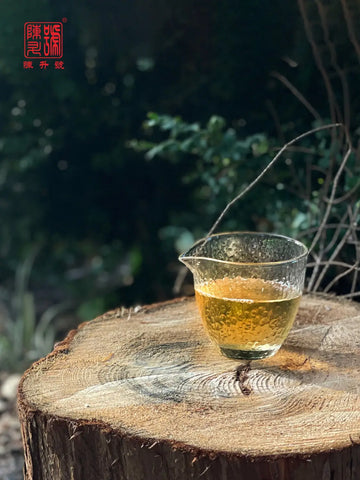
Caffeine-free teas offer a diverse range of flavors and health benefits without the stimulating effects of caffeine. Explore the varieties below for your relaxation and enjoyment.
Herbal Teas
Herbal teas, also known as tisanes, are steeped from a variety of aromatic plants. These teas do not come from the Camellia sinensis plant, so they naturally contain no caffeine. Some popular examples include:
- Chamomile Tea: Soothing and often used for its calming properties.
- Peppermint Tea: Known for aiding digestion and providing a refreshing taste.
- Lemon Balm Tea: Has a mild lemon scent and is thought to relieve stress.
Rooibos Teas
Rooibos teas are exclusively from the South African Aspalathus linearis bush. They are rich in antioxidants and have a naturally sweet, earthy flavor.
- Red Rooibos: The traditional version, fermented to create a reddish-brown color.
- Green Rooibos: Unfermented and offers a more herbal taste profile.
Fruit Teas
Fruit teas are infusions made from dried fruits, flowers, spices, and herbs. They are vibrant and can be enjoyed hot or cold.
- Berry Infusions: A mix of various dried berries resulting in a tangy and sweet beverage.
- Apple Cinnamon Tea: A warm, spice-forward option ideal for cooler weather.
- Hibiscus Tea: Has a tart flavor and deep-red color; often consumed for potential blood pressure management.
Decaffeinated Teas
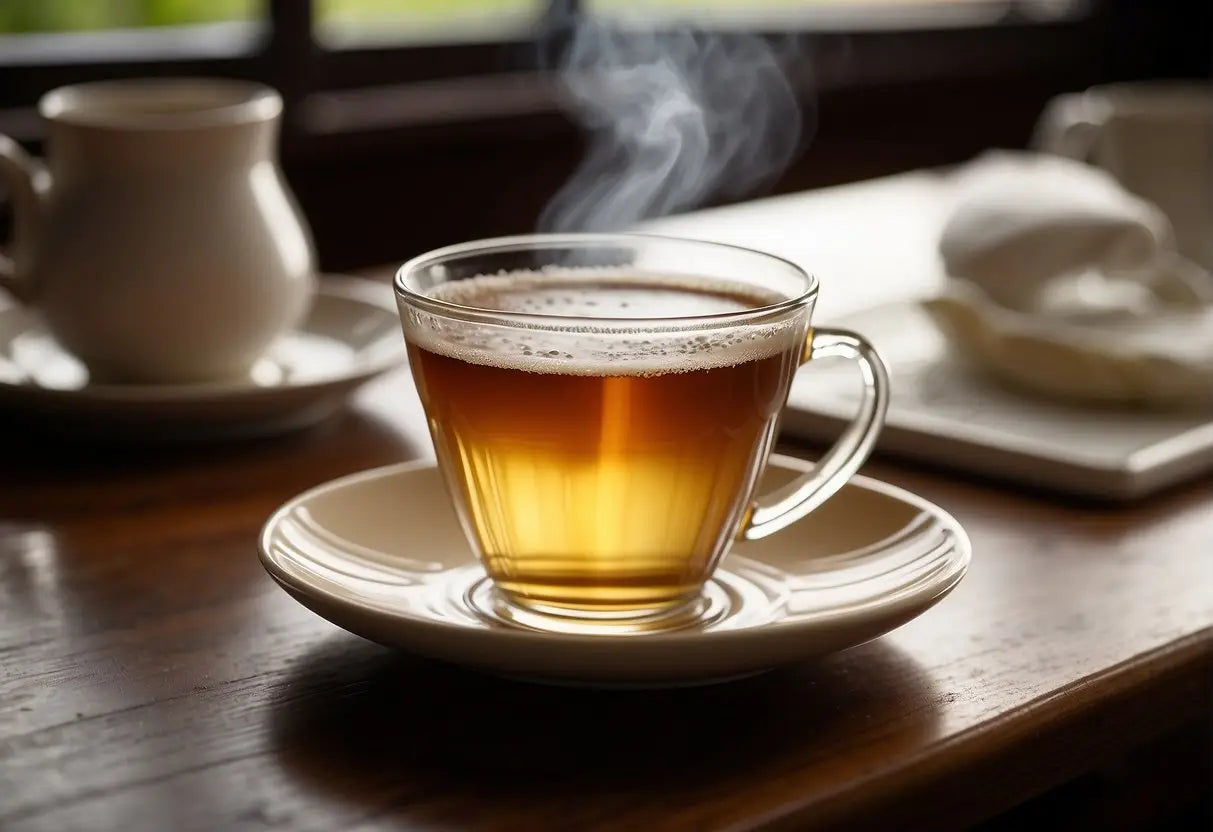
When you're exploring the world of decaffeinated teas, understand that these are beverages from which caffeine has been removed to varying degrees. Even though they're labelled "decaffeinated," they may still contain minimal amounts of caffeine. Common decaffeination processes include the use of carbon dioxide, organic solvents, or water.
Types of Decaffeinated Tea:
- Black Tea: Typically robust in flavor, decaffeinated versions retain most of the character without the caffeine kick.
- Green Tea: Known for its subtle flavors and health benefits, decaffeinated green tea offers a milder energy boost.
- Herbal Tea: Naturally caffeine-free, herbal teas like peppermint or chamomile are not decaffeinated but free of caffeine from the start.
Popular Decaffeination Methods:
- Carbon Dioxide Process: Non-toxic and retaining the most flavor.
- Solvent-Based Processes: Utilize ethyl acetate or methylene chloride to remove caffeine.
- Water Processing: A chemical-free method that may slightly alter taste.
Remember, decaffeinated teas can provide a relaxing experience or a gentle uplift without the potent effects of caffeine. They are a great choice if you are sensitive to caffeine or want to reduce your intake while still enjoying the ritual and taste of a freshly brewed cup of tea. When selecting a decaffeinated tea, consider the process used as it can affect both flavor and the residual caffeine level.
Health Benefits of Caffeine-Free Teas
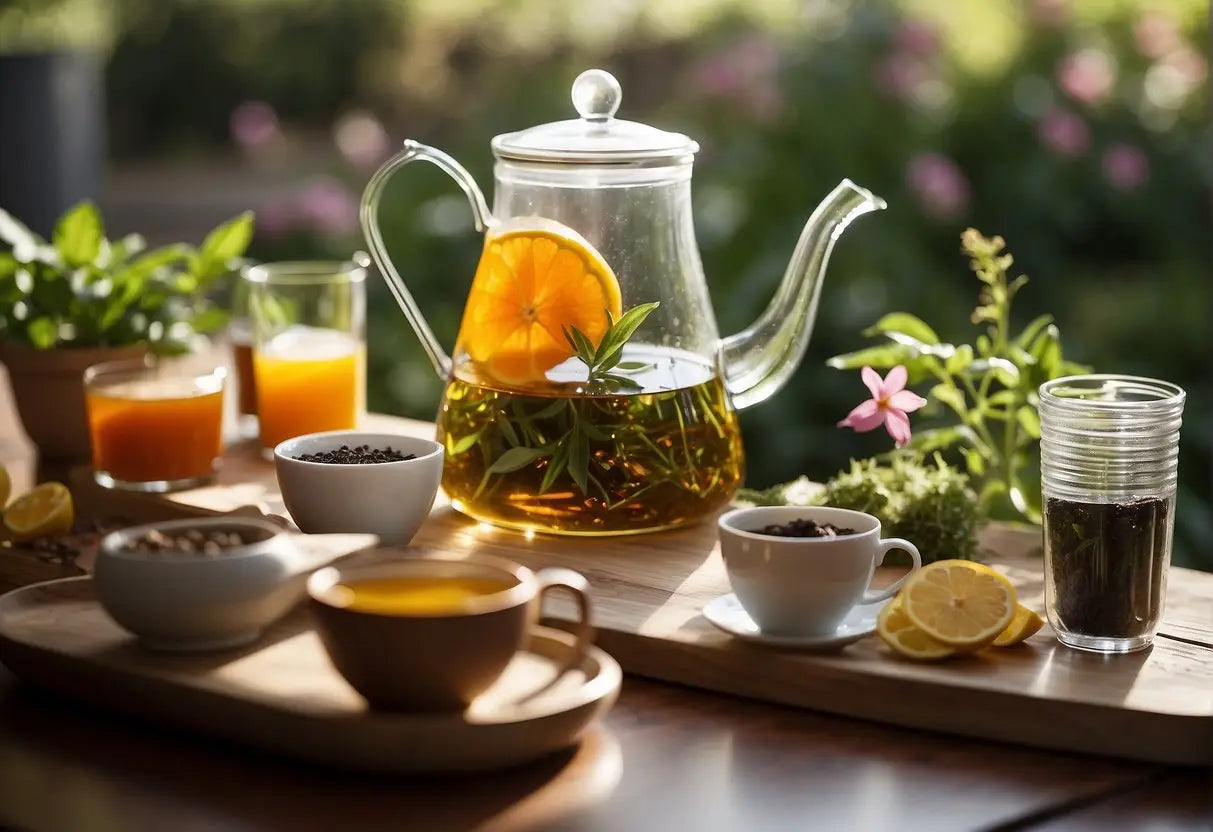
Lao Ban Zhang
Caffeine-free teas offer a range of health benefits that can enhance your well-being. These benefits range from improving your sleep to aiding digestion.
Improved Sleep Quality
By choosing caffeine-free teas before bedtime, you may improve your sleep quality. This is due to the absence of caffeine, which can interfere with your sleep cycle. Herbs like chamomile and valerian root, often found in caffeine-free teas, have been traditionally used to promote relaxation and better sleep.
Reduced Anxiety
Caffeine is a stimulant that can exacerbate anxiety symptoms. Caffeine-free herbal teas, such as passionflower or lemon balm, can help in reducing stress and anxiety levels. They contain natural compounds that have a calming effect on your nervous system.
Digestive Aid
Many caffeine-free teas can act as natural digestive aids. For example:
- Peppermint Tea: Eases symptoms of bloating and indigestion.
- Ginger Tea: Helps to relieve nausea and improve digestion.
- Fennel Tea: Known to alleviate issues like gas and cramping.
These herbal teas contain compounds that assist in relaxing the digestive tract muscles, thereby improving digestion.
Popular Caffeine-Free Tea Brands
Finding a caffeine-free tea that you enjoy can be a simple task with the plethora of available options. When you're sifting through the tea aisle or browsing online, you might want to consider these well-regarded brands known for their caffeine-free selections.
Celestial Seasonings is a standout for its range of herbal blends. Sleepytime and Chamomile are among the favorites, providing a tranquil, calming experience without any caffeine.
Another prominent name is Twinings of London, offering a variety of herbal teas such as Pure Peppermint and Lemon & Ginger, both of which do not contain caffeine.
For those who appreciate organic options, Traditional Medicinals provides a robust selection of organic, caffeine-free teas. Their Roasted Dandelion Root and Throat Coat are popular choices noted for their soothing qualities and natural ingredients.
Here is a comparative list of some caffeine-free tea options from these brands:
| Brand | Tea Flavor | Notable Ingredients |
|---|---|---|
| Celestial Seasonings | Sleepytime | Chamomile, Spearmint, Lemongrass |
| Celestial Seasonings | Chamomile | Pure Chamomile |
| Twinings of London | Pure Peppermint | Pure Peppermint |
| Twinings of London | Lemon & Ginger | Lemon, Ginger, Blackberry Leaves |
| Traditional Medicinals | Roasted Dandelion Root | Roasted Dandelion Root |
| Traditional Medicinals | Throat Coat | Licorice Root, Marshmallow Root |
Lastly, if you enjoy fruity teas, Stash Tea is a brand that offers a delightful variety of caffeine-free fruit teas, such as Meyer Lemon and Wild Raspberry Hibiscus. The absence of caffeine means you can indulge in these teas at any time of the day or night, without the risk of disrupting your sleep cycle.
Preparing Caffeine-Free Teas
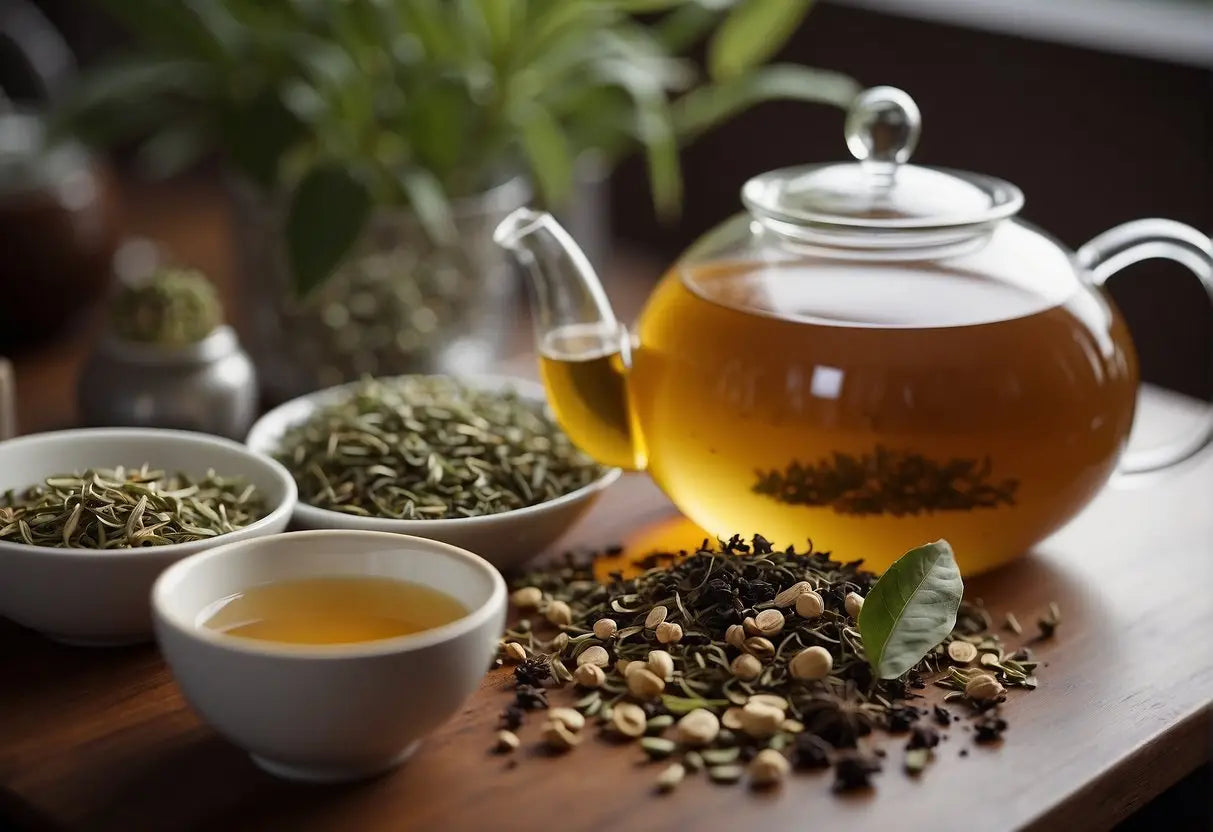
To enjoy caffeine-free teas, proper brewing techniques are essential, as well as serving suggestions that complement the natural flavors.
Brewing Techniques
When brewing caffeine-free teas, such as herbal infusions or tisanes, begin with fresh, cold water. If you're using tea bags, steep one bag per 8 oz of water. With loose leaves or petals, use 1 to 1.5 teaspoons per 8 oz. Bring the water to a rolling boil, then pour it over your caffeine-free tea and let it steep. Here is a quick guide:
- Chamomile: Steep for 5 to 10 minutes.
- Peppermint: Steep for 5 to 7 minutes.
- Rooibos: Steep for 4 to 6 minutes.
- Hibiscus: Steep for 5 to 10 minutes.
Herbal teas are more forgiving than their caffeinated counterparts, so steeping a bit longer won’t necessarily make them bitter.
Serving Suggestions
After brewing your caffeine-free tea, consider serving it in a way that enhances your experience. For a refreshing twist, add fresh lemon or a cinnamon stick to your cup. If you prefer a sweeter drink, stir in honey or agave nectar to taste. For iced tea lovers, cool your brewed tea and serve over ice with a sprig of mint for a cooling drink. Serve your herbal tea in clear glassware to appreciate the color and serve at a comfortable drinking temperature.
Caffeine-Free Tea Recipes
Herbal teas are a delightful way to enjoy a caffeine-free beverage. Below are a couple of recipes you can try at home:
Peppermint Tea:
- Ingredients: Fresh peppermint leaves
-
Instructions:
- Rinse a handful of peppermint leaves.
- Boil water and pour it over the leaves.
- Steep for 5-7 minutes, then strain.
- Optional: Sweeten with honey or sugar to taste.
Chamomile Tea:
- Ingredients: Dried chamomile flowers
-
Instructions:
- Add 1 tablespoon of dried chamomile flowers to a cup.
- Pour boiling water over the chamomile.
- Let it steep for 5 minutes, then strain.
- Optional: Enhance flavor with honey or a slice of lemon.
Lemon Balm Tea:
- Ingredients: Fresh lemon balm leaves
-
Instructions:
- Use about 2 teaspoons of fresh lemon balm leaves per cup of water.
- Boil water and pour it over the leaves.
- Steep for at least 5 minutes, then strain.
- Optional: Add a cinnamon stick during steeping for a spice note.
Rooibos Tea:
- Ingredients: Loose rooibos leaves or rooibos tea bag
-
Instructions:
- Place a teaspoon of rooibos leaves or a tea bag in a cup.
- Add boiling water and steep for 7 minutes.
- Optional: Include a dash of milk or a sweetener if preferred.
Enjoy these recipes for a relaxing and soothing cup of caffeine-free tea. Remember to adjust sweetness and steeping times according to your taste preferences.
Storing Caffeine-Free Teas
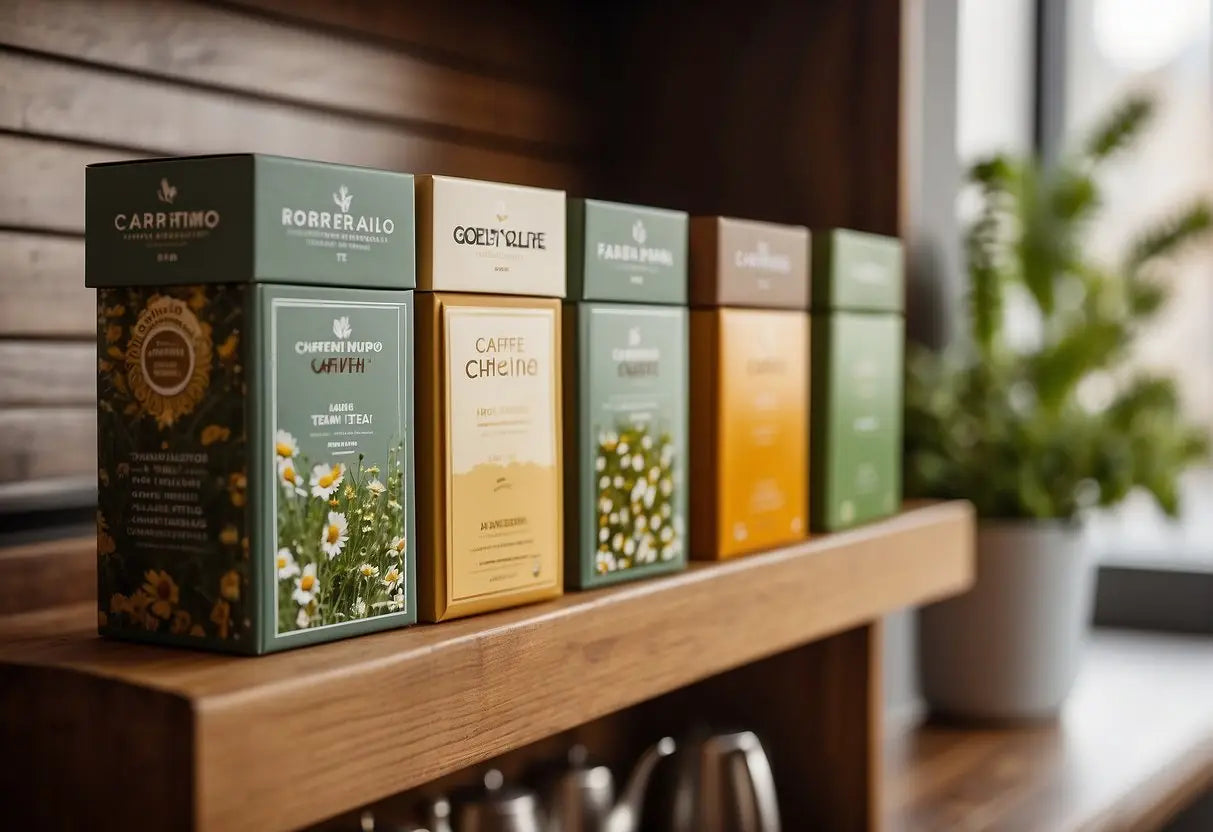
When storing your caffeine-free teas, it's crucial to keep them away from heat, light, moisture, and strong odors. Here's how you can ensure your teas stay fresh:
Location: Choose a cool, dark place like a pantry or a drawer. Avoid the temptation to display teas on a window sill or countertop where sunlight can degrade their quality.
Containers: Airtight containers are your best option. This could be tins, dark glass jars, or opaque caddy's. Ensure they have a tight seal to prevent air from entering and moisture from getting in.
Temperature: Strive to maintain a consistent temperature. Extreme temperature fluctuations can harm the delicate leaves, leading your tea to lose flavor.
Moisture: Keep your teas in a dry environment to prevent mold. If you're storing in a kitchen, ensure they're not near a stove or sink.
Humidity: Use desiccants like silica gel packets if you live in a high-humidity area to keep the air in your tea storage as dry as possible.
Separation: Since teas can absorb odors, store them away from spices, coffee, or any strong-smelling foods.
Labeling: Mark the date of purchase on your containers to keep track of freshness. Most teas are best consumed within a year of purchase.
Herbal Infusions: If you have herbal caffeine-free teas, the same rules apply, although some, like chamomile, may have a longer shelf life.
| Do | Don't |
|---|---|
| Use airtight containers | Expose to strong odors |
| Keep in a cool, dark place | Store in transparent containers |
| Label with purchase date | Let moisture in |
Following these storage tips will help preserve the delicate flavors and aromas of your caffeine-free teas.
Identifying and Buying Caffeine-Free Teas
When searching for caffeine-free teas, it's essential to distinguish between naturally caffeine-free and decaffeinated options. Herbal teas, made from non-tea plants, are naturally caffeine-free. Examples include:
- Peppermint
- Chamomile
- Rooibos
- Lemon balm
To ensure you're buying a caffeine-free product, check for the following indicators on packaging:
- Labels: Look for "caffeine-free" or "herbal tea" on the front label.
- Ingredients List: Confirm that it contains only herbal components without any tea leaves (Camellia sinensis).
Decaffeinated teas are made by removing caffeine from regular tea leaves. While they contain trace amounts of caffeine, they are an option if you're reducing caffeine intake. They're labeled "decaffeinated" and undergo one of several processes to remove caffeine.
| Where to Buy | Types of Teas Available | Considerations |
|---|---|---|
| Health Food Stores | Wide variety, including organic and specialty blends | Higher price, but often higher quality |
| Supermarkets | Common brands, convenience | May have fewer options |
| Online Shops | Broad selection, hard-to-find items | Check reviews for quality |
Purchasing tips:
- Buy from reputable sources to ensure product quality.
- Consider eco-friendly and ethical brands.
- Sample different brands and flavors to find your favorites.
Caffeine Content Comparisons with Other Beverages
When selecting a beverage, you might consider its caffeine content. Unlike herbal teas, which generally have no caffeine, other common drinks vary in their caffeine levels. Here's a brief comparison:
Coffee: A standard 8-ounce (240-ml) cup of coffee typically contains about 95 mg of caffeine, although this can vary widely.
Black Tea: On average, an 8-ounce (240-ml) serving contains about 47 mg of caffeine, roughly half that of a similar-sized coffee.
Green Tea: This variety provides around 28 mg of caffeine per 8-ounce (240-ml) cup, often lauded for a more subtle energy boost.
Soft Drinks: A 12-ounce (355-ml) can might deliver 20–40 mg of caffeine, depending on the brand and formulation.
Energy Drinks: These can range from about 50 mg to a staggering 250 mg of caffeine per 8 ounces (240-ml).
Decaffeinated Coffee: Although not caffeine-free, an 8-ounce (240-ml) cup typically has about 2 mg of caffeine.
For a caffeine-free choice, consider herbal tea options such as peppermint, rooibos, or chamomile, which naturally contain no caffeine at all.
| Beverage | Caffeine Per Serving |
|---|---|
| Coffee | ~95 mg/8 oz |
| Black Tea | ~47 mg/8 oz |
| Green Tea | ~28 mg/8 oz |
| Soft Drinks | 20-40 mg/12 oz |
| Energy Drinks | 50-250 mg/8 oz |
| Decaf Coffee | ~2 mg/8 oz |
| Herbal Tea | 0 mg |
Use this table to guide your beverage choice based on your caffeine preferences or requirements.
Frequently Asked Questions
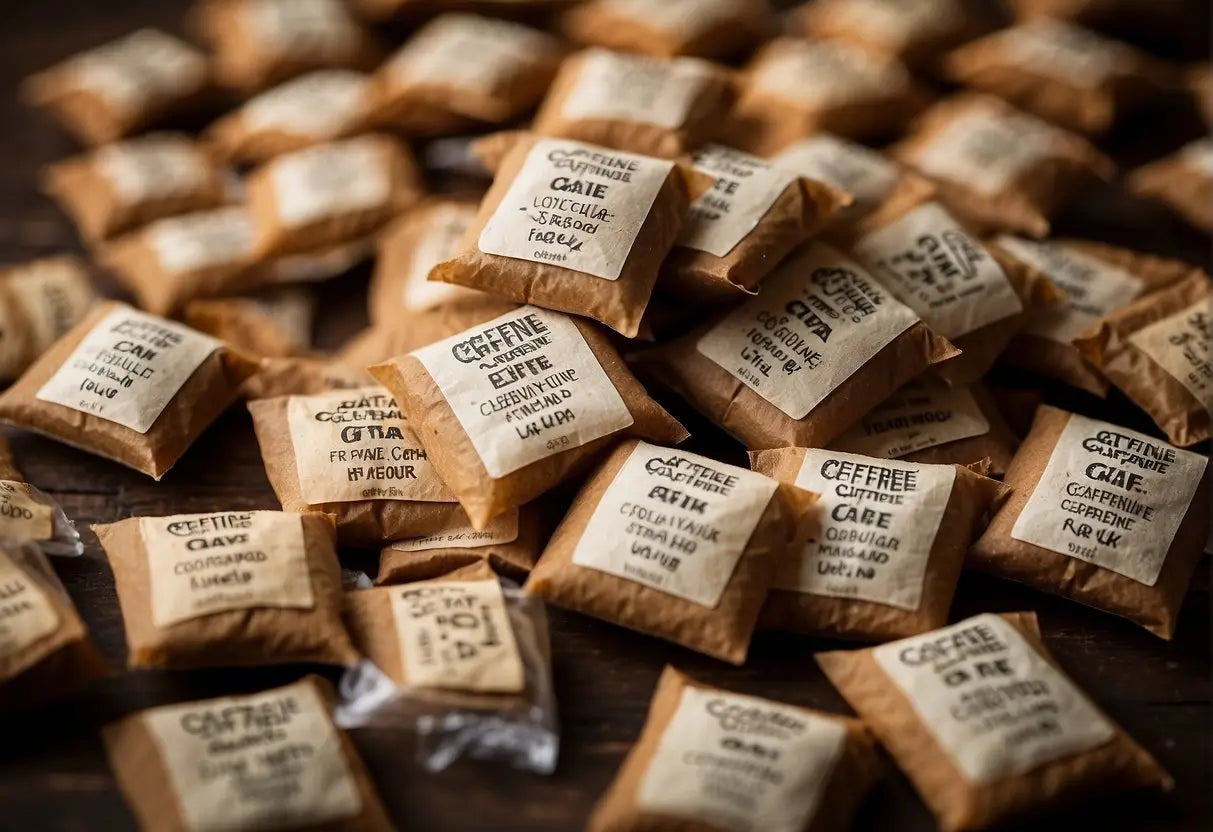
When you're exploring the world of caffeine-free teas, you'll discover a variety of options that cater to health benefits and personal tastes. Below are answers to common queries on caffeine-free teas.
Which herbal teas are naturally free from caffeine?
Herbal teas such as peppermint, chamomile, rooibos, and hibiscus are naturally devoid of caffeine. These options are great if you're looking to avoid caffeine entirely.
What are the top brands offering caffeine-free tea options?
Brands like Celestial Seasonings, Yogi Tea, and Harney & Sons have a reputation for producing a wide range of caffeine-free tea varieties that cater to diverse preferences.
Can you suggest some caffeine-free teas that are good for weight loss?
For weight loss, caffeine-free teas like green rooibos and dandelion tea are often recommended. These teas are known for their metabolism-boosting properties without containing caffeine.
Are there any black tea varieties that are decaffeinated?
Yes, there are decaffeinated versions of black tea available. These teas undergo a process to remove most of the caffeine while attempting to retain the tea's original flavor.
What are the health benefits associated with drinking caffeine-free tea?
Drinking caffeine-free tea can improve your sleep quality, reduce anxiety, and may have antioxidant properties. These benefits make them a good choice for a relaxing beverage without the stimulation of caffeine.
How does Earl Grey tea rank in terms of caffeine content?
Traditional Earl Grey tea contains caffeine as it is made with black tea leaves. However, decaffeinated versions are available if you enjoy the flavor but wish to limit your caffeine intake.
← Older post Newer post →











